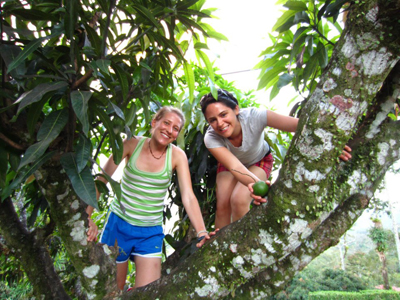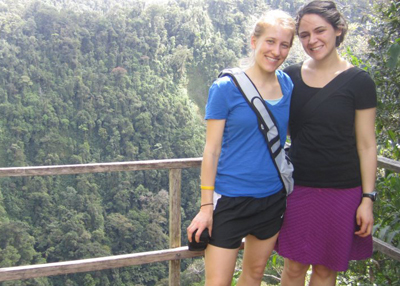Posted 2:31 p.m. Thursday, March 29, 2012

 [/caption]
Every day in the jungle is a new adventure.
That’s what UW-L students Cassandra DeHaro and Rachel Boldt say as they learn how to become future health educators in the rain forests of Costa Rica. The two are offering health education and health promotion programs in San Miguel, Costa Rica, spring semester as part of their degree requirements in Community Health Education.
But their efforts are also meeting a community need in a city of 2,000. On any given day the two can be found taking blood pressure at local clinics, holding water aerobics classes in a community pool, growing vegetables in a garden with elementary school kids or learning about health needs of locals as they travel from house to house with a primary care technician from San Miguel. They also spread the word — in Spanish — about health topics such as hand-washing, exercise, nutrition and the risk of diabetes.
“One thing that is surprising is the sheer abundance of fruits and vegetables, yet the extreme lack of consumption of these vitally important foods to one’s health,” says Boldt.
DeHaro says she is also surprised by the abundance of land that goes uncultivated.
“People could grow crops year round and do not take advantage of this,” she says.
The two try to serve as role health models — particularly for their host families.
“Our host families quickly noticed how we value exercise and healthy eating. Slowly, but surely, members of our family are starting to make changes in their diet and lifestyle habits,” says Boldt. “We look forward to seeing what can happen by the end of our time here in San Miguel.”
DeHaro and Boldt’s global experience is typical of undergraduate students in UW-L’s Bachelor of Science in Community Health Education program. The last semester of their senior year, all undergraduate candidates complete a 560-hour experience like this before graduation. It’s called a preceptorship and is similar to an internship, however, students have mentors at the work sites. Students in the past have gone to places such as Australia, England and British Columbia. Others stay within the United States or even near La Crosse, working at Mayo Clinic, Gundersen Lutheran, the La Crosse County Health Department, Coulee Council on Addictions and other sites.
[caption id="attachment_10465" align="alignright" width="400" caption="From left, Rachel Boldt and Cassandra DeHaro pictured in Costa Rica. Read more about their travels at cassandralorilei.tumblr.com."]
[/caption]
Every day in the jungle is a new adventure.
That’s what UW-L students Cassandra DeHaro and Rachel Boldt say as they learn how to become future health educators in the rain forests of Costa Rica. The two are offering health education and health promotion programs in San Miguel, Costa Rica, spring semester as part of their degree requirements in Community Health Education.
But their efforts are also meeting a community need in a city of 2,000. On any given day the two can be found taking blood pressure at local clinics, holding water aerobics classes in a community pool, growing vegetables in a garden with elementary school kids or learning about health needs of locals as they travel from house to house with a primary care technician from San Miguel. They also spread the word — in Spanish — about health topics such as hand-washing, exercise, nutrition and the risk of diabetes.
“One thing that is surprising is the sheer abundance of fruits and vegetables, yet the extreme lack of consumption of these vitally important foods to one’s health,” says Boldt.
DeHaro says she is also surprised by the abundance of land that goes uncultivated.
“People could grow crops year round and do not take advantage of this,” she says.
The two try to serve as role health models — particularly for their host families.
“Our host families quickly noticed how we value exercise and healthy eating. Slowly, but surely, members of our family are starting to make changes in their diet and lifestyle habits,” says Boldt. “We look forward to seeing what can happen by the end of our time here in San Miguel.”
DeHaro and Boldt’s global experience is typical of undergraduate students in UW-L’s Bachelor of Science in Community Health Education program. The last semester of their senior year, all undergraduate candidates complete a 560-hour experience like this before graduation. It’s called a preceptorship and is similar to an internship, however, students have mentors at the work sites. Students in the past have gone to places such as Australia, England and British Columbia. Others stay within the United States or even near La Crosse, working at Mayo Clinic, Gundersen Lutheran, the La Crosse County Health Department, Coulee Council on Addictions and other sites.
[caption id="attachment_10465" align="alignright" width="400" caption="From left, Rachel Boldt and Cassandra DeHaro pictured in Costa Rica. Read more about their travels at cassandralorilei.tumblr.com."] [/caption]
“It is the most anticipated part of the program. Candidates can’t wait,” says Gary Gilmore, professor and director, Graduate Community Health/Public Health Programs. “It gives them the opportunity not only to refine their skill sets but also to communicate and connect with unique and distinct cultures.”
Boldt and DeHaro speak Spanish every day. They’ve encountered culture shock as well as new ideas about healthcare.
“I am learning and witnessing the health status/health care system of a new country,” says Boldt. “This experience is expanding my horizons and challenging me daily.”
And they are challenged to lead as they collaborate with TELL Volunteers, a grassroots non-profit organization in San Miguel focused on revitalizing the community of San Miguel and the surrounding areas.
“The projects we are involved in are grassroots. In other words, we plan, implement and evaluate everything,” says DeHaro. “We are responsible for making our programs sustainable so that when we leave our programs will continue to live on without our help.”
[/caption]
“It is the most anticipated part of the program. Candidates can’t wait,” says Gary Gilmore, professor and director, Graduate Community Health/Public Health Programs. “It gives them the opportunity not only to refine their skill sets but also to communicate and connect with unique and distinct cultures.”
Boldt and DeHaro speak Spanish every day. They’ve encountered culture shock as well as new ideas about healthcare.
“I am learning and witnessing the health status/health care system of a new country,” says Boldt. “This experience is expanding my horizons and challenging me daily.”
And they are challenged to lead as they collaborate with TELL Volunteers, a grassroots non-profit organization in San Miguel focused on revitalizing the community of San Miguel and the surrounding areas.
“The projects we are involved in are grassroots. In other words, we plan, implement and evaluate everything,” says DeHaro. “We are responsible for making our programs sustainable so that when we leave our programs will continue to live on without our help.”
